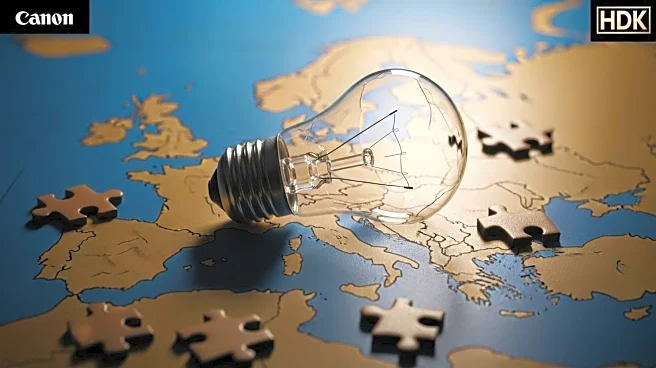What's Happening?
The energy crisis in Europe is escalating, driven by soaring energy prices, infrastructure challenges, and geopolitical tensions. Energy prices for consumers in the UK have risen significantly, with Ofgem setting the maximum annual rate for an average household at £1,755 for gas and electricity. This increase is attributed to volatile international gas markets, energy costs, and taxes aimed at funding net-zero initiatives. The UK manufacturing sector, particularly the cement and metals industries, is experiencing a downturn, relying more on imports due to high energy costs. British Steel's operations were taken over by the government after nearly shutting down blast furnaces due to these costs. The crisis is further exacerbated by poor infrastructure in the national grid and a reliance on imports for oil and gas.
Why It's Important?
The European energy crisis has significant implications for various sectors and stakeholders. High energy prices are affecting industrial output, leading to increased reliance on imports and potential job losses in manufacturing. The crisis is also challenging the UK's energy strategy, with political parties debating the best approach to manage energy costs and transition to net-zero. Labour's focus on clean energy and net-zero policies aims to reduce long-term energy costs, but faces opposition from those advocating for increased domestic drilling and reduced reliance on international gas prices. The crisis highlights the need for effective energy policy reform to balance environmental goals with economic stability.
What's Next?
The UK government faces pressure to address the energy crisis through tax reforms and changes to the energy system. Labour plans to accelerate the net-zero transition, aiming for 95% of electricity generation from clean power by 2030. This includes investing in clean power, deploying mini nuclear power stations, and banning new oil exploration licenses. However, these initiatives will take years to impact energy prices. Meanwhile, opposition parties propose scrapping net-zero targets and expanding oil and gas extraction to lower energy bills. The ongoing debate suggests potential shifts in energy policy and strategy in the coming years.
Beyond the Headlines
The energy crisis in Europe raises ethical and environmental concerns regarding the balance between economic growth and sustainable energy practices. The reliance on gas for setting energy prices, despite cheaper renewable options, highlights systemic issues in energy pricing models. The debate over net-zero policies and their impact on energy costs underscores the complexity of transitioning to sustainable energy while maintaining economic stability. Long-term shifts in energy policy could redefine the European energy landscape, influencing global energy markets and environmental strategies.










